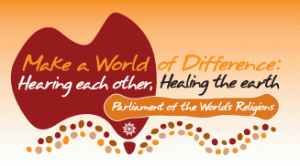Council for Parliament of the World´s Religions

> SWAMI VIVEKANANDA´s SPEECH AT THE COUNCIL 1893, Chicago <
There have been several meetings referred to as a Parliament of the World’s Religions, most notably the World’s Parliament of Religions of 1893, the first attempt to create a global dialogue of faiths. The event was celebrated by another conference on its centenary in 1993. This led to a new series of conferences under the official title „Parliament of the World’s Religions“.
In 1893, the city of Chicago hosted the World Columbian Exposition, an early world’s fair. So many people were coming to Chicago from all over the world that many smaller conferences, called Congresses and Parliaments, were scheduled to take advantage of this unprecedented gathering. A number of congresses were held in conjunction with the exposition, including those dealing with anthropology (one of the major themes of Exposition exhibits), labor, medicine, temperance, commerce and finance, literature, history, art, philosophy, and science. One of these was the World’s Parliament of Religions. The Parliament of Religions was by far the largest of the congresses held in conjunction with the Exposition. Read More: > HERE <
Our Mission – The Council for a Parliament of the World’s Religions was created to cultivate harmony among the world’s religious and spiritual communities and foster their engagement with the world and its guiding institutions in order to achieve a just, peaceful and sustainable world. To accomplish this, we invite individuals and communities who are equally invested in attaining this goal.
Our Vision – The vision of the Council for a Parliament of the World’s Religions is of a just, peaceful and sustainable world in which:
- Religious and spiritual communities live in harmony and contribute to a better world from their riches of wisdom and compassion
- Religious and cultural fears and hatreds are replaced with understanding and respect
- People everywhere come to know and care for their neighbors
- The richness of human and religious diversity is woven into the fabric of communal, civil, societal and global life
- The world’s most powerful and influential institutions move beyond narrow self-interest to realize common good
- The Earth and all life are cherished, protected, healed and restored
- All people commit to living out their highest values and aspirations.
Our Approach – The Council for a Parliament of the World’s Religions seeks to promote interreligious harmony, rather than unity. The problem with seeking unity among religions is the risk of loss of the unique and precious character of each individual religious and spiritual tradition; this understanding is key to our framework.
Interreligious harmony, on the other hand, is an attainable and highly desirable goal. Such an approach respects, and is enriched by, the particularities of each tradition. Moreover, within each tradition are the resources (philosophical, theological and spiritual teachings and perspectives) that enable each to enter into respectful, appreciative and cooperative relationships with persons and communities of other traditions.
> Parliament of World´s Religions utube Channel <
> The Dalai Lama addresses Parliament of World Religions 2009 <
Our Opportunity – We live in a world of difference. Yet, we are interdependent. Nowhere is learning to live with difference more important than religion.
Too often, religion is misused as an instrument for division and injustice, betraying the very ideals and teachings that lie at the heart of each of the world’s great traditions. At the same time, religious and spiritual traditions shape the lives of billions in wise and wonderful ways. They gather people in communities of shared beliefs and practices. When these diverse communities work in harmony for the common good, there is hope that the world can be transformed.
Over the years, the Council has initiated dialogues and nurtured relationships among people of difference. In doing so the Council has provided a framework for expressing many visions of a just, peaceful and sustainable future. In the process, religious and spiritual communities have discovered a shared commitment to ethical principles.
This shared commitment has opened the way for a new era of cooperative action among the world’s religious and spiritual communities as well as civil and political societies. The well-being of the Earth and all life depends on this collaboration.
Meet Council for a Parliament of the World’s Religions (CPWR) at fb <
Meet Declare 2010 THE YEAR OF PEACE – Make it the largest Group of fb <
Vivekananda highlights the ignorance of those, who claim their religion as the BEST. It should always be ‚ONE OF THE BEST‘ instead.
The one who finds fault with other religion, is ignorant of not only that religion, but his own. Because there are sufficient proofs in all religions from which people have reached the zenith in all fields, whether it is spirituality or social life or any field for that matter.
If there are any issues it should be with the people who follow it with misconceptions and not with the religion itself.
So my friends, stop abusing other religions, and try to follow your religion with faith, no matter whether it is your original or converted religion.
This segment is taken from an audio release, about the Life and Works of Swami Vivekananda.
Though it is not the actual voice of Vivekananda, we can feel the power of his thoughts on Hinduism, and his respect for other religions
Comments are closed.